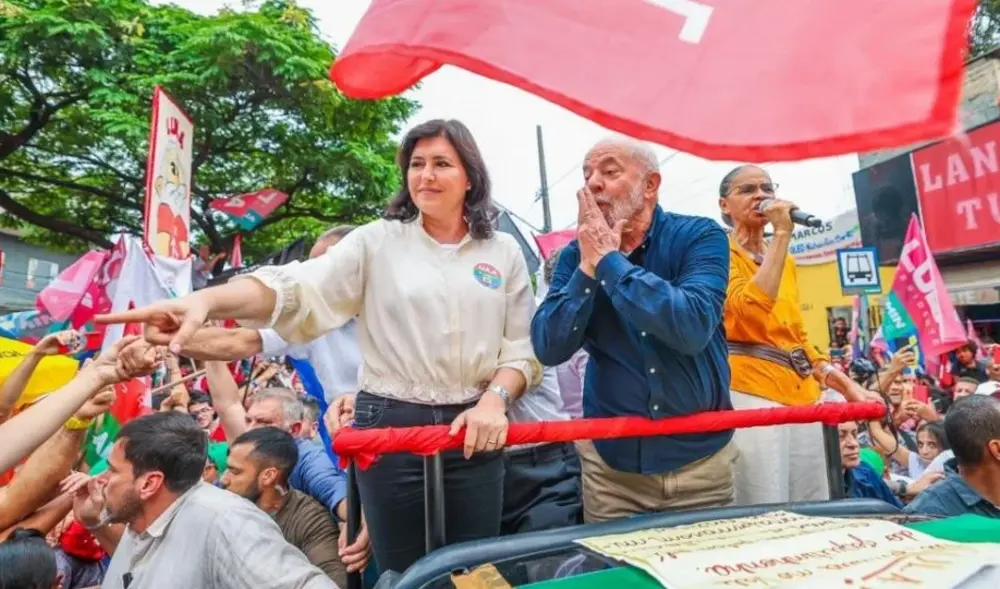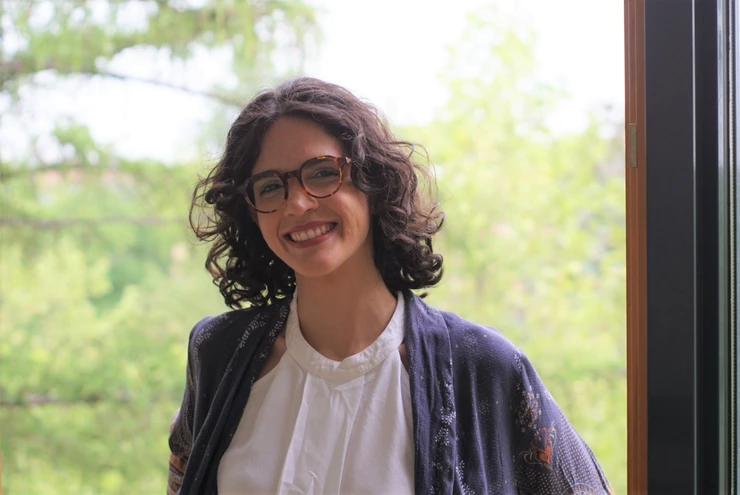Climate Policy under a new Lula Presidency beyond the Amazon

Lula campaigns side-to-side with Simone Tebet, the presidential candidate and agribusiness politician who supported him on the run-off, and environmentalist Marina Silva. (Photo source: Ricardo Stuckert)
The recently deceased french philosopher Bruno Latour declared that Brazil could save the world, if only it found solutions for itself1. Latour raised a very big if, but he does not seem alone in this hope. World leaders rushed to congratulate the blue-collar worker turned president turned inmate turned president2, Luiz Inácio Lula da Silva. He was promptly invited to the United Nations Framework Convention on Climate Change’s Conference of the Parties (COP)3. In a world plagued by rising income inequality, democratic erosion, and looming climate catastrophe, global public opinion seems to trust that, Lula’s brand of conciliatory politics will be able to, once again, deliver progress in social indicators and environmental protection, while maintaining an agenda of economic growth and fiscal responsibility. In the run-up to COP, Lula’s team has advertised4 ambitious measures, such as fixing the NDC revision made by the Bolsonaro government (which was deemed a “climatic embezzlement” by climate specialists)5, greening the tax system, ending deforestation, and creating a national authority for Climate security.
The bet on Lula’s moderately reformist leadership style is a safe one. He has already signaled that undoing the legal disarray in the environmental sector left by Bolsonaro6. However, global public opinion might overestimate former successes in Brazilian climate policy and underestimate the political challenges of the former president’s new fixture. Da Silva first came to power amidst the Latin American pink tide and the favorable winds of a global commodity boom, with the task of better distributing the dividends of economic growth in a deeply unequal country. Income increases due to policies such as the “Bolsa Família”7 cash transfer and indexation of the minimum wage to inflation8 drove internal demand. Both external and internal demand enabled economic growth and reduction of poverty9 without distributive conflict. When it comes to the environment, the combination of ingenious deforestation policies10, sectoral consensus and innovation-fueled productivity in the agricultural and animal husbandry sectors11 put the conflict of interest between rainforest protection and economic gain to a halt.
However, later events in Brazilian politics culminating in the election of Jair Bolsonaro and his solid basis in the “beef, bible, and bullets” caucus of conservatives, evangelicals, and landowners12 in the national congress showed this equilibrium to be fraught. Now, the question on the Brazilian and Global table is whether a conciliatory balance is enough, or even possible, to face the social and environmental challenges of 2022.
Even the most conservative institutions now admit that keeping the world on track to reach the 1.5 ° C goal from the Paris agreement requires a profound reform of global economic systems than what policymakers have offered until now. In the best-case scenario, keeping our current institutions and economic system requires greening the whole economy. This count on considerations of environmental issues across all sectors and levels of economic activity13. On the scientific level, this task faces considerable uncertainties in assessing environmental and climate benefits and risks on a granular level14. On the social, economic, and political levels, it raises the challenge of creating new economic and business models to tackle transition risks and reward green activities while ensuring economic benefits to counter economic inequality and poverty15. In Public Policy terms, it requires recovering the environmental bureaucracies dismantled by the Bolsonaro government16 and building institutions to turn climate and environmental issues into cross-sectoral, structural, whole-of-governance issues17 18. Structural prioritization and intersectoral integration, nevertheless, are feats that Brazilian climate policy never achieved.
The National Plans that stifled deforestation during the Lula years notwithstanding, climate policy in Brazil was barely able to leave the narrow area of technocratic science and foreign policies19. Starting from the 1990s, when the international visibility and incentives prompted by hosting Eco 92 fostered the creation of governance institutions tasked with climate action, the country created federal-level political governance structures to tackle climate change20. Some progress has been made, as these political structures – committees, forums, and so on, composed by representatives of ministries and agencies – were reformed or replaced to include representatives from more sectors, and put under the formal command of authorities higher in the political hierarchy21. The lifelong environmentalist and former Environment Minister Marina Silva, particularly, is credited with turning climate and environment into cross-cutting political issues22. Brazil would eventually assume a leadership role in global climate negotiations, basing its credibility on the early adoption of an intended nationally determined contribution in 2009 in Copenhagen, and adopting a National Climate Change Act in the same year23.
As Brazilian wisdom told, theories look like something else in practice. The National Climate Change act is a prime example of that. It created new decisory and implementation bodies composed of a broad range of ministries, under which it subsumed other policies and pre-existing structures. It determined that state-level climate forums should convene with the national climate forum for technical policy dialogue and federative integration. Finally, it instituted a climate change fund to be capitalized with proceeds from deep-sea oil exploration. Nonetheless, studies showed that the new bodies lacked decision power to steer policy and remained inactive for most of the 2010s24 25. State-level Forums barely materialized, and federative states, which hold an array of decisive authority under the Brazilian Constitution, did not have any other venue to participate in national policy26. Finally, after congressional and Supreme Court battles, the federative states chose to grab each their bite of oil royalties, thus emptying the national climate fund’s pot27.
Lula’s promised policies require significant investment in the creation and rehabilitation of federal bureaucracies, the creation of governance structures with strong steering power and an outstanding capacity for articulation with public and private sectors on many levels of the federative structure, and support from a possibly unfriendly national congress. The global scenario will also look less favorable. Although Latin American and Brazilian growth have rebounded after the pandemic, this growth was headed by the agricultural sector, and has less distributive effects28. Interests from other sectors of the global economy, such as minerals needed for the energy transition, conflict directly with conservation and indigenous peoples’ interests29. The less productive, more prone to deforestation part of the agriculture and husbandry sector is very much present in the elected national congress30 31. In theory, part of the private sector (including agriculture and husbandry) only theoretically recognizes that climate and environment are good for business. However, those actors are less vocal in politics and envision a lighter-touch role for the government in climate policy32. Regarding the public budget, the fragmentation of executive power enabled by the national congress in the last few years33 and the debt left by Bolsonaro’s profligate campaign spending will limit his capacity to invest34.
Consensus and green reforms are, for now, in the realm of ambition. Lula’s political cunning, the sheer technical capacity of his campaigns’ environmental team, and Brazilian Federal bureaucracies might suffice to overcome some of the aforementioned challenges, but not alone. The global appetite for a successful model for a green economy seems to drive much of the hopes for Brazilian success, but until now, only deforestation in the Amazon has been able to attract consistent funding35. Whether flows of green investment with positive distributive dividends will materialize to secure government revenues, private sector cooperation, and ultimately, the popularity on which Lula relied to steer strong policies, remains to be seen. In the context of developed countries falling short of their climate finance pledges36 and generalized suspicion of “greenwashing” in global sustainable markets37, we need to know not only if Lula will make it, but also if and how the world will help Brazil to help itself.
1 www1.folha.uol.com.br/ambiente/2020/09/se-o-brasil-achar-solucao-para-si-vai-salvar-o-resto-do-mundo-diz-bruno-latour.shtml
2 www.dw.com/en/brazil-presidential-election-world-leaders-congratulate-lula/a-63596512
3 www.carbonbrief.org/daily-brief/brazils-lula-to-send-reps-to-cop27-climate-summit-after-election-win/
4 www1.folha.uol.com.br/ambiente/2022/11/em-vez-de-chantagem-brasil-fara-historia-na-cop27-diz-marina-silva.shtml
5 www1.folha.uol.com.br/ambiente/2022/04/brasil-oficializa-pedalada-climatica-em-nova-meta-de-reducao-de-gases.shtml
6 congressoemfoco.uol.com.br/area/governo/governo-lula-vai-comecar-com-revogaco-de-normas-sobre-meio-ambiente-e-armamento/
7 www.ilo.org/wcmsp5/groups/public/---americas/---ro-lima/documents/article/wcms_limd3_11_en.pdf
8 www.centreforpublicimpact.org/case-study/bolsa-familia-in-brazil
9 bibliotecadigital.fgv.br/dspace/handle/10438/24994
10 www.sciencedirect.com/science/article/pii/S1389934118304623
12 blogs.lse.ac.uk/usappblog/2021/10/17/book-review-beef-bible-and-bullets-brazil-in-the-age-of-bolsonaro-by-richard-lapper/
13 www.elibrary.imf.org/view/journals/001/2021/296/article-A001-en.xml
14 www.sciencedirect.com/science/article/pii/S0921800922000994
15 www.unep.org/resources/report/transition-green-economy-benefits-challenges-and-risks-sustainable-development
16 oeco.org.br/colunas/o-fracasso-ambiental-do-governo-de-jair-bolsonaro/
17 www.idsbrasil.org/wp-content/uploads/2022/09/IDS_AgendaEconomiaVerde_2022_final-1.pdf
18 www.teses.usp.br/teses/disponiveis/106/106132/tde-14122020-202302/pt-br.php
19 www.teses.usp.br/teses/disponiveis/106/106132/tde-14122020-202302/pt-br.php
20 repositorio.unb.br/handle/10482/21486
21 www.scielo.br/j/cint/a/zHnDvDdHKw4s5gqWnD4947J/
22 wwfbr.awsassets.panda.org/downloads/como_se_governa_a_pnmc_no_brasil_hoje.pdf
23 www.wribrasil.org.br/publication/monitoramento-daimplementacao-da-politica-climatica-brasileira
24 bibliotecadigital.fgv.br/dspace/handle/10438/7825
25 repositorio.unb.br/handle/10482/39485
26 www.arca.fiocruz.br/handle/icict/24276
27 repositorio.unb.br/handle/10482/21486
28 c5509108-4fe8-4859-ab1f-1bd83e6e46a3.filesusr.com/ugd/098c59_9fd52f0a4faf4b19b209df53bb560129.pdf
29 www.embrapa.br/visao-de-futuro/intensificacao-tecnologica-e-concentracao-da-producao/sinal-e-tendencia/concentracao-da-producao-e-da-renda-no-agro-brasileiro
30 observatoriodamineracao.com.br/investment-funds-injected-us-54-billion-into-mining-companies-with-interests-in-indigenous-territories-in-the-amazon/
31 www.climatepolicyinitiative.org/wp-content/uploads/2020/05/WhitePaper_Pecuaria_PT_112019_final-2.pdf
32 www.dw.com/pt-br/de-um-jeito-ou-de-outro-amaz%C3%B4nia-perde-as-elei%C3%A7%C3%B5es/a-63419720
33 www2.camara.leg.br/orcamento-da-uniao/estudos/2021/artigo-glo_2021-05-31_publicacao
34 www.correiobraziliense.com.br/economia/2022/10/5046605-buraco-esta-mais-proximo-de-rs-400-bi-diz-meirelles-sobre-rombo-fiscal.html
35 www.dw.com/pt-br/noruega-anuncia-que-vai-desbloquear-fundo-amaz%C3%B4nia/a-63606257
36 unfccc.int/process-and-meetings/bodies/constituted-bodies/standing-committee-on-finance-scf/progress-report
37 www.bloomberg.com/news/articles/2021-07-18/european-esg-assets-shrank-by-2-trillion-after-greenwash-rules

Mariana Lima Maia is an MPP Candidate with experience in policy implementation, interinstitutional relations, communication, and research in the fields of Human Rights, Climate Change, Climate Finance, and Gender. She holds a Bachelor’s degree in Law from her Alma Mater in Brazil, and developed her policy skills through internships and volunteer engagements in public and private organizations. In the Climate field, she has gained experience through internships at the German International Cooperation Agency and UNFCCC. Her professional goal is to build a future for people and the planet by linking Climate Policy, Sustainable Development, and Human Rights.
~ The views represented in this blog post do not necessarily represent those of the Brandt School. ~